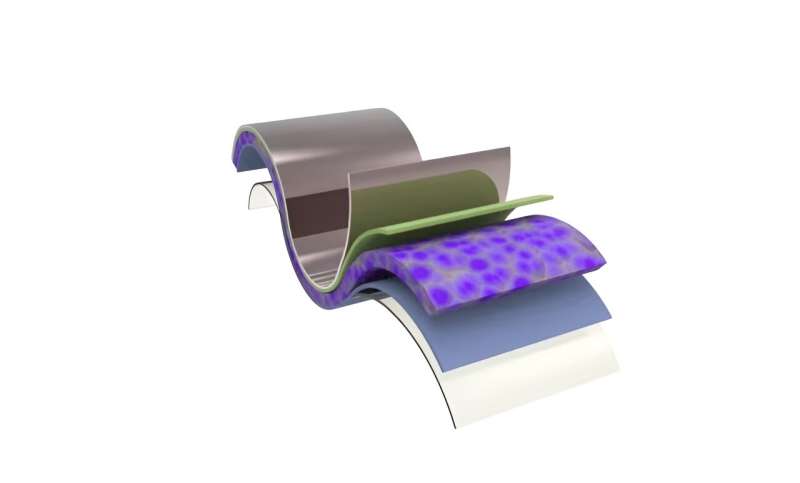This article has been reviewed according to Science X's editorial process and policies. Editors have highlighted the following attributes while ensuring the content's credibility:
fact-checked
peer-reviewed publication
trusted source
proofread
Ductile oligomeric acceptor enables highly efficient and mechanically robust flexible organic solar cells

A research group led by Prof. Ge Ziyi at the Ningbo Institute of Materials Technology and Engineering (NIMTE) of the Chinese Academy of Sciences has incorporated a ductile oligomeric acceptor (DOA) into the polymer donors and small molecule acceptors (PD:SMA) system, achieving flexible organic solar cells (OSCs) with high power conversion efficiency (PCE) and mechanical robustness. The study was published in Advanced Materials.
Due to the advantages of light weight, flexibility, and processability, OSCs have been recognized as ideal candidates for flexible power sources.
With the growth of the emerging market of wearable electronic devices, high PCE and mechanical robustness have shown their importance in the development of wearable applications of OSCs. However, compared with rigid OSCs, flexible OSCs exhibit relatively low PCEs (≈17%) and poor mechanical robustness.
To address this issue, the researchers proposed a novel strategy that incorporates a DOA as a third component into the PD:SMA blend system of OSCs. Three DOAs, i.e., DOY-C2, DOY-C4, and TOY-C4, were synthesized with different flexible bridging chain segments and molecular chain lengths.
The photophysical, mechanical, and photovoltaic properties of D18:N3 with these different DOAs were analyzed. The incorporation of DOY-C4 into the D18:N3 system contributes to the enhancement of the PCE for both rigid OSCs and flexible OSCs, which can be attributed to a significant reduction in the voltage losses of the devices.
In addition, the flexible device based on the D18:N3:DOY-C4 achieved an outstanding PCE of 17.91%, which is among the highest values reported to date for flexible OSCs.
Moreover, D18:N3:DOY-C4-based flexible OSCs showed an excellent mechanical robustness with a crack-onset strain (COS) of 11.7%, indicating a 50% increase in COS compared with the D18:N3-based device.
After 2,000 consecutive bending cycles, the developed flexible OSCs based on D18:N3:DOY-C4 can retain 98% of the initial PCE, thus showing excellent mechanical stability.
This study has provided a promising effective and facile way to develop stable ternary OSCs that combine high efficiency and mechanical robustness.
More information: Qinrui Ye et al, Ductile Oligomeric Acceptor‐Modified Flexible Organic Solar Cells Show Excellent Mechanical Robustness and Near 18% Efficiency, Advanced Materials (2023). DOI: 10.1002/adma.202305562
Journal information: Advanced Materials
Provided by Chinese Academy of Sciences





















